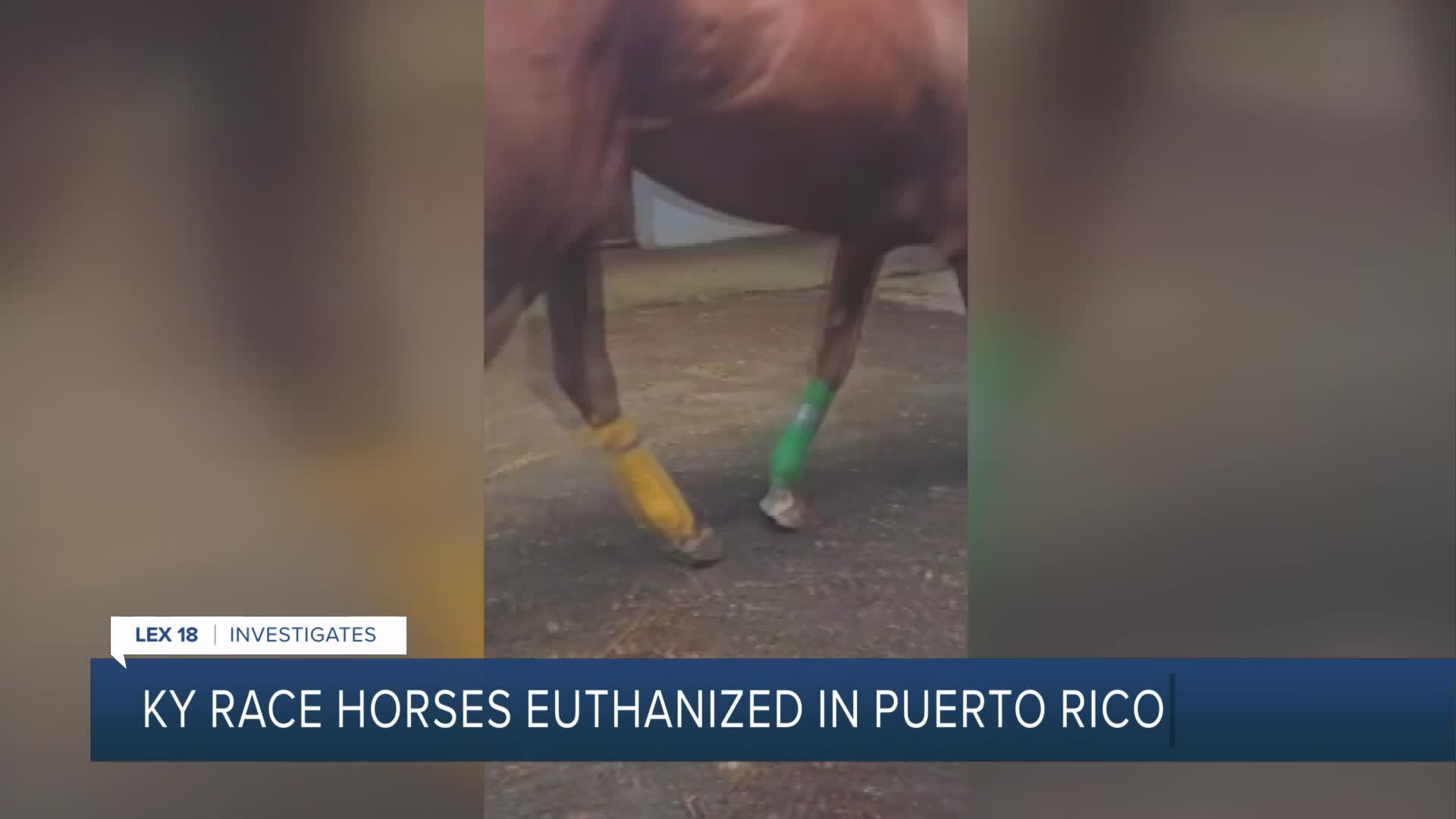(LEX18) — Advocates for horse welfare are speaking out after what they call an alarming pattern: an astonishing number of horses being raced to death in Puerto Rico — including one bred at the University of Kentucky.
Lexington has long held the title of “Horse Capital of the World,” a place where horses are deeply loved and carefully cared for.
Kayseri, a thoroughbred foal born as part of the UK: Animal Science Program, raced from 2019 to 2021 with standout speed figures — including a career-high 100 rating in 2020, according to Horse Racing Nation. But by 2021, her performance had declined, and she was sold to a buyer in Puerto Rico.
Chrissy Laughlin, who has a lengthy background in the horse industry and worked with Caribbean Thoroughbred Aftercare (CTA) for seven years, says Kayseri’s transfer involved grueling conditions.
“She came from Gulfstream Park after a ninth-place finish,” Laughlin explained. “Within three days she was on a cargo ship to Puerto Rico.”
According to Laughlin, the horses stand in 40-foot containers, just three feet apart, for a three-day voyage through rough waters in the Bermuda Triangle and Puerto Rico Trench. Upon arrival, Kayseri went straight back to racing.
From 2023 to 2024, Kayseri’s speed figures fell, and she stopped placing in races. By late June 2024, she had a “did not finish” (DNF) and was placed on the vet’s list. Concerned for her health, Laughlin, her breeders, and CTA emailed the Puerto Rico Racing Commission.
Nine days later, they received a video update showing Kayseri weighing just 937 pounds — far below the 1,000-1,500 average for racing thoroughbreds. Despite this, her owner had no plans to retire her.
Kayseri’s last race took place December 27, 2024. In March 2025, Laughlin requested another update and learned the devastating news: Kayseri had been euthanized months earlier, in January, due to degenerative joint disease.
“The most disappointing thing is that red flags were raised,” Laughlin said. “We reached out multiple times, but it’s part of a larger systemic failure in racing that starts in the U.S. and ends in Puerto Rico.”
Sadly, Kayseri’s story is not unique. Hundreds of other horses face the same fate in Puerto Rico.
La Macacoa, another thoroughbred, arrived from Puerto Rico in June 2024 and raced six times. By August, Caribbean Thoroughbred Aftercare co-founder Kelley Stobe — who has worked in Puerto Rico for 30 years — found the horse completely emaciated and too weak to stand. After 13 hours of attempted treatments, La Macacoa was euthanized.

“I feel every day I’m not doing enough,” Stobe said. “How can you change the mindset of people that these horses’ lives matter?”
Stobe works alongside the police at times to help build a case on behalf of the horse. The hope is to get justice and bring awareness to what is happening in Puerto Rico.
Mister Catholic, a top U.S. grass racer, was sold to a Puerto Rican buyer in March 2023. His former owner, trainer Liane Davis, said she was shocked to learn he had been starved, crippled with a knee injury, and very lame.

Davis is a professional thoroughbred racehorse trainer who is known in the Midwest circuit.
“He apparently injected him and maybe shock waved him and did whatever until he could get him to the race. And they said the plan was if he didn’t snap his leg they were going to euthanize him," explains Davis.
According to Davis, in the U.S., if a horse is injected with anabolics, they aren't allowed to race for 30 days and must be monitored. She explains in Puerto Rico a horse can be injected every six days and still race.
“He was a bag of bones,” Davis said.
In May 2024, she bought him back, but during quarantine, she discovered his halter had adhered to his head, ripping away chunks of flesh when removed.
After Davis brought Mister Catholic back home, she was also able to get him back to health with a treadmill, aqua therapy, and surgery.
Advocates say the issue is not new.
“This is the way they do business in Puerto Rico,” Laughlin said.
What they want is clear: oversight and accountability.
“These broken horses need better evaluation,” Stobe said. “Vets, owners, and trainers must be held responsible for what’s happening to them.”
Two other breeders with Areion Thoroughbreds, Corinna Wildermuth and Lauren Roach, also lost a horse in Puerto Rico. Their horse's last race was on April 2, 2023, and on April 26, they were informed their horse had been euthanized.
“She had just won a race. So to see her deteriorate. We got an email that basically said 'Buzz off, you have no right to ask questions.' We have that email," explains Roach.
“It almost feels like these horses get shipped off to Puerto Rico with broken bones. Many of them shouldn’t be running. The mode how they make it to Puerto Rico on the container ships and cargo ships and then make it on the island," explains Wildermuth.
Stobe shares other stories of horses whose health declined after racing in Puerto Rico.
"Cara Bonita was a horse that was raced and was living emaciated until she was euthanized on-site. Stobe says she never had a chance to eat grass."
"Prophetic dream was given away from the racing owner. We found him two months after he left the track in this condition. He is now living his best life in Maryland."
"El Galdiador was also given away to a lady who could not care for him. She contacted the owner and asked for help. She finally contacted us and asked us to take him. He lived with us at CTA as part of our sanctuary herd for two years, and then he was humanely euthanized due to his suspensory injury breakdown that he had when he arrived."






